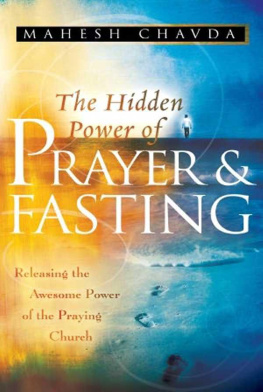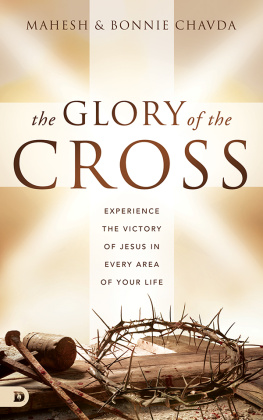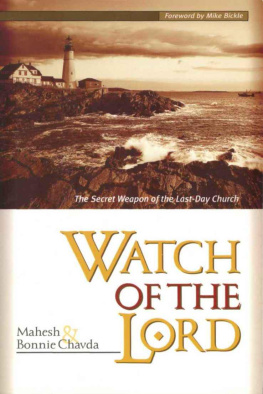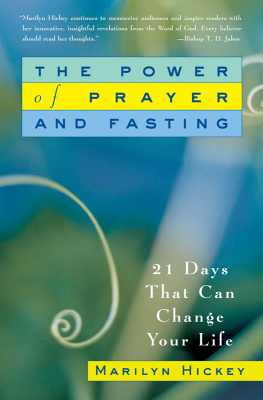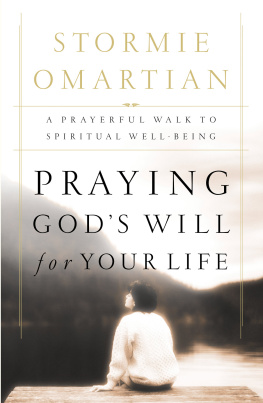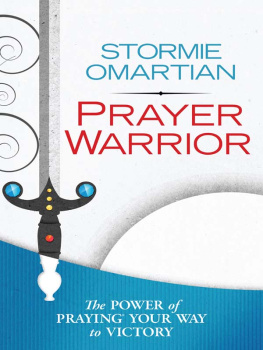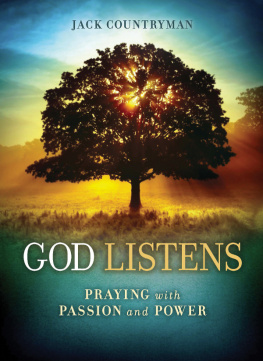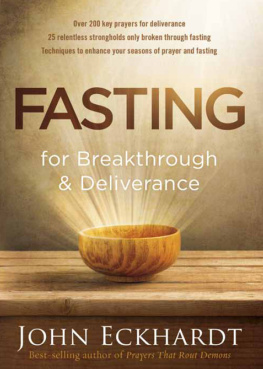TABLE OF CONTENTS
Chapter One
Chapter Two
Chapter Three
Chapter Four
Chapter Five
Chapter Six
Chapter Seven
Chapter Eight
Chapter Nine
Chapter Ten
ENDORSEMENTS
Mahesh Chavda has experienced Gods grace to fast in a way that has borne much fruit. He is a man of deep passion for Jesus, and this love has been his motivation to pursue the deep places in Gods heart. Mahesh has profound personal experience in this area. His understanding will be an inspiration and instruction to many. I recommend this book.
Mike Bickle , Senior Pastor
Metro Christian Fellowship
Few men in our day have fasted and prayed as often and seen the results that Mahesh Chavda has had in his dynamic ministry. This book will invite you into new depths with God.
John Arnott , Senior Pastor
Toronto Airport Christian Fellowship
It has been one of my great privileges to know and walk with Mahesh Chavda for more than 20 years. His ministry and teachings come from the trenches of experience. This book is more than just another good manual on the theology of prayer and fasting; you have in your hands a stick of dynamite loaded with spiritual power and impartation that comes from one of the modern-day pioneers who has walked what he talks. Your hunger for God will grow and your appetite for this world will diminish when you devour this book. Fasting will become a delight and not just a sacrifice!
Jim W. Goll , Founder
Ministry to the Nations
FOREWORD
Fasting used to be a normal Christian practice, but for most of my Christian experience, it has been out of fashion. Many are looking for quick and easy solutions to their problems, for an instant spirituality that can be had without discipline or sacrifice. Western culture has taught us to expect things quickly. We have instant foods and instant credit. Theres very little that we have to wait for today. And whatever else fasting may be, it is a form of waiting uncomfortable waiting. So fasting runs contrary to the spirit of the times.
It also runs contrary to the theology of some. I once heard a theological professor give a lecture on fasting to a room full of mostly other professors. He concluded that fasting was only a last resort in times of great crisis. The implication was that fasting outside times of crisis was an unbiblical and unprofitable practice. None of the academics in the room questioned his conclusion. The only one to do so was a pastor who hadnt had the benefit of a seminary education, but who fasted regularly. However, he was no match for the more theologically sophisticated in the room. So to the majoritys great relief, the conclusion that fasting was simply not a relevant part of the normal Christian experience was allowed to stand.
In some quarters just the mention of fasting raises warning cries of legalism. Whether this is because of the abuses that have occurred in connection with past practices of fasting, or whether it is reflective of a desire to have a form of Christianity that does not require us to sacrifice, I do not know. I do know that the loss of the biblical practice of fasting has caused the Church to forfeit some to the power of the Holy Spirit and some of the intimacy with Jesus that God would have enjoyed giving to us.
Prayer hasnt fared much better than fasting. Even though we may acknowledge the importance of prayer, we have a difficult time praying consistently. The number one confession that Ive heard from church-going people over the last 30 years of ministry is that they cant seem to pray regularly. It is almost easier to do anything than to pray. To the unpracticed , prayer feels like the weakest of all the spiritual disciplines. Its help is often only sought when everything else has failed.
There are signs that prayer and fasting may be making a comeback. Major leaders in the Church are calling people to fast and pray for revival, and the Church is beginning to respond. In this connection I am happy to recommend Mahesh Chavdas new book. The value of this book is not found in the offer of some new theories about prayer and fasting. The primary value of the book is not even in the wise advice it offers on how to pray and fast, why one ought to pray and fast, how to avoid legalistic prayer and fasting, or even the detailed descriptions of the many benefits of prayer and fasting. The real power of the book is that it has been written by one who for the majority of his Christian life has prayed and fasted as a way of life. By the grace of God, Mahesh Chavda has experienced some of the divine power that comes from a life of prayer and fasting, and at the same time has managed to avoid the temptations of legalism and spiritual pride that always plague those who fast and pray. Some of the supernatural stories in this book will challenge the reader, and some may find them difficult to believe. But if the testimony of Church history can be believed, those who fast and pray receive supernatural answers to their prayers. This is also the testimony of the Bible. Why should it surprise us that wonderful things happen when we do what God asks us to do?
And herein lies the real value of these pages. They are a truthful account of one mans journey with God, told in a way that encourages us to do what God asks us to do.
Jack Deere
Evangelical Foundation Ministries, Inc.
PREFACE
The Hidden Power of Prayer and Fasting by Mahesh Chavda is timely and meets a great need in the Church today. I know of no other person who is more competent to write a book on fasting than my dear friend Mahesh Chavda .
This book is a great spiritual tool for serious-minded believers who are cultivating a biblical lifestyle of prayer and fasting. Mahesh gives us a deep, yet practical understanding of the fundamental principles and motivation of fasting. His presentation is clear and lucid. His reasoning is profound, yet transparent, making the book a valuable contribution to believers of all backgrounds.
I wholeheartedly recommend this book to all who would follow the Lord Jesus Christs example as He sought His Fathers face through prayer and the fasted lifestyle.
Paul Cain
Kansas City, Missouri
Chapter One
What Is the Answer for Stevie?
E arly in my walk with Christ, I went to work at a hospital for mentally handicapped children in Lubbock, Texas. Just like Jesus was driven or impelled by the Holy Spirit to go to the wilderness, I was impelled to enter my own wilderness in Texasand it was this state school for profoundly handicapped children. It was one of the most tragic places I could have chosen. My days there were filled with heartbreaking hours of interaction with broken and hurting children in an atmosphere filled with some of the most foul smells you can imagine. The children I worked with didnt have control over their bowel functions. Many times they would smear excrement all over themselves, over the doors, and over you. I often asked, Lord, is this You ? Did You really guide me here?
Before long I came to understand that the Lord had brought me there by sovereign appointment to teach me about Himself. That place in Lubbock, Texas, was my own personal school of the Holy Spirit. In fact, most of the key principles I use in my ministry today I learned in that place.
There were hundreds of little children there, and most of them had basically been thrown away or discarded by their parents. Although they were officially wards of the state, in reality they were little pieces of broken humanity whom nobody wanted and nobody claimed. The Lord said to me, My Word says if your father and mother forsake you, I will take you up. I want you to go and love these little ones and be My ambassador of love.1 So I went.
For the first nine hours, I would work with the ambulatory children, those who could walk. Then I would go to the non-ambulatory wards to work with little brain-damaged babies. Many had been born to mothers on heroin, and others landed there after their alcoholic parents had brutally attacked and injured them in fits of rage or alcohol-induced delirium. These babies would stay in the little cribs until they were too big to fit in them, and I would just hold them in my arms and gently rock them in a rocking chair while I prayed in tongues (my prayer language of the Spirit). I just knew Jesus loved them, and I knew that I loved them too. It was as if Jesus broke off a little piece of His heart and put it in me. I truly loved those little children.

